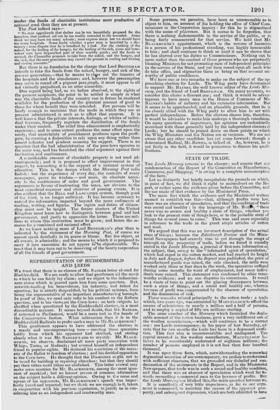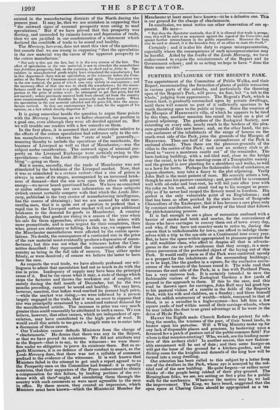STATE OF TRADE.
THE Leeds Mercury returns: to the charge ; and asserts that our condemnation of the Report of the Committee on Manufactures, Commerce, and Shipping, "is owing to a complete misconception of the facts."
Let us distinctly but briefly recapitulate the grounds on which, in point of fact, we did think it right to animadvert on the Re- port, or rather upon the evidence given before the Committee, and the use made of that evidence by the Ministerial Press. The main fact which the evidence and the Ministerial writers seemed to establish was this—that, although profits were low, there was an absence of speculation, and that the condition of trade was sound and healthy : in the language of Mr. BATA, " there never was so secure and healthy a state of things, whether yon look to the present state of things here, or to the probable state of things for several years to come." This was said more especially in reference to the trade in the great staple articles of cotton and wool.
We argued that this was an incorrect description of the actual. state of things ; because the Edinburgh Review and the Minis- terial Newspapers had scarcely time to net through the songs of triumph on the prosperity of trade, before we found it roundly stated in the Leeds Mercury, a journal of first-rate information on the subject, that, owing to the "infatuated spirit of speculation,- which had raged in the cotton market, and had reached its height in July and August, before the Report was published, the price of manufactured goods was raised, the. sale checked, the mills were worked only three or four days in the week, the operatives suffered during some months for want of employment, and many indivi- duals were ruined. This statement was confirmed by other trust- worthy evidence; and no one disputes its correctness. It would be a waste of time to point out the glaring discrepancy between such a state of things, and a sound and healthy one, wherein lowness of profit was compensated by the absence of speculation_ and the diminution of risk.
These remarks related principally to the cotton trade; a trade which, two yeare ago, was estimated by MACCULLOCH to afford the means of subsistence to nearly a million and a half of persons, and to employ a capital of fifty-six millions sterling. The same number of the Mercury which furnished the deplo- rable account of the cotton business, gave a very indifferent one of the woollen nia.nufacture,—which still continues to be a correct one : our Leeds contemporary, in his paper of last Saturday, ad- mits that for two months the trade has been in a depressed cozidie tion. This fact also is incontrovertible and undisputed. The capital invested in the woollen manufacture, MACCULLOCH be- lieves to be considerably • underrated at eighteen millions ; the number of persons employed in it is not less than four hundred thousand.
It was upon these facts, which, notwithstanding the somewhat dogmatical assertion of our contemporary, we profess to understand with sufficient clearness, that we grounded our disbelief and con- demnation of the statements in the Report, and in the Ministerial Newspapers; that trade was in such a sound and healthy condition. and that there was an absence of speculation which went far to- wards reconciling commercial men to the lowness of profits. But the Leeds Mercury has blinked this, the main question between' es. It is manifestly of very little importance, as far as our mega- ment is concerned, to ascertain the causes of the apparent wee- perity, and subsequent depression, which are both admitted to have existed, in the manufacturing districts of the North during the ,present year.. It may,he, that we. are mistaken in supposing that " the outward signs of unusual prosperity were owing to read speculations." But if we have proved that this prosperity was fleeting, and succeeded by ruinous losses and depression of trade, -then we are justified in our condemnation of a statement which declared the conditidn.of trade to be sound and healthy. The Mercury, however, does not meet this view of the question; but asserts that we, are wrong in supposing "that the speculation in the raw material was the cause of the apparent prosperity in the cotton manufacture."
"Not only is this not the fact, but it is the very reverse of the fact. The effect of speculation in the, raw material, is not to stimulate the manufacture into fictitious prosperity, but, on the contrary, to check and to fetter it. Spe- culation in manufactured goods might have stimulated the manufacture • but in this department there was no speculation, as the witnesses before the manufacture; of the House of Commons assert again and again. The speculation was in the raw material, the price of which rose very unduly in consequence ; and the necessary effect of that rise was to check the manufacture; for the manu- facturer could no longer work to a profit, unless the price of goods rose in pro- portion to the price of cotton wool : he attempted to get that price, but did not succeed; orders previously, received both from abroad and from the country were countermanded; and therefore be necessarily, made fewer goods. When the speculation in the raw material subsided and the price fell, then the manu- facture revived. So that our contemporary has relied, for the support of his opinion, on a fact which directly disproves it."
It is going somewhat beside the question to argue these points with the Mercury; •because, as we before observed, our position is a good one, even although they were all decided against us. But we will trouble our readers with a few remarks on them.
In the first place, it is assumed that our observation relative to the effects of the cotton speculation had reference only to the cot- ton manufacturers; whereas the " state of trade" generally,— ineaning thereby to include the operations of the merchants, the business of Liverpool as well as that of Manchester,—was the subject under consideration. The outward signs of unusual pro- perity on the Liverpool Exchange were certainly owing to the speculations—what the Leeds Mercury calls the " desperate gam- bung "—going on there. But it seems, secondly, that the trade of Manchester was not stimulated by the briskness of the Liverpool market. Now, that it was so stimulated to a certain extent—that a rise of prices is always in some of its stages, accompanied by an increased brisk- ness of demand—that the one acts upon the other with great energy—we never heard questioned before. We have no conceited or undue reliance upon our own information on these subjects (which cannot certainly compete with that which the Leeds Mer- cury, published in the very centre of manufacturing intelligence, has the means of obtaining) ; but we are assured by able mer- cantileomen, that it is quite out of question to pretend that a rapid rise in the Liverpool cotton market will not give additional briskness to the demand for goods in Manchester. A country dealer, seeing that goods are rising in a season of the year when his sale for them approaches, always sends in his orders with more promptitude, and is more urgent for their completion, than wher. prices are stationary or falling. In this way, we suppose that the Manchester manufactures were affected by the cotton specu- lations. No doubt, the consequence of a continued rise in the price of the raw material must eventually produce a depression of manu- factures; but this was not what the witnesses before the Com- mittee described: they represented the commercial affairs of the country as being in the full tide of success. They either spoke falsely, or were deceived ; of course we believe the latter to have
been the case.
As respects the wool trade, we have already professed our wit-
. lingness to admit that speculation had not so much to do with the rise in price. Inadequacy of supply may have been the principal cause of it. But be the cause what it may, a state of things which stops the factories and throws the workmen out of employ, not merely during the dull month of December, but for the two months preceding, cannot be sound and healthy. We may here, however, mention, that before wool reached its present high price, —while the market was rising,-,--we were informed by a person largely engaged in the trade, that it was an error to suppose that rise was principally occasioned by a sound and natural demand for the manufactured article. The increase in price was very much greater than could reasonably be attributed to such a cause. We can believe, however, that other causes, which are independent of spe- culation, may have contributed to the high price of wool. It Would swell this article to too great a length were we to enter into
a discussion of these causes.
, Our Yorkshire censor defends Ministers from the charge of " charlatanerie." He denies that there was any in the Report, or that we have proved its existence. We did not attribute any to the Report—that is to say, to the witnesses : we were there- fore under no obligation to prove its existence there. But as re- gards Ministers, it is no defence of their conduct to assert, as the Leeds Mercury does, that there was not a syllable of comment prefixed to the evidence of the witnesses. It is well known that Ministers failed in the attempt to get such a report agreed to as the Prosperity-men on the Committee had framed: it is equally notorious, that their supporters of the Press endeavoured to obtain a compensation for this failure, by lauding portions of the evi- dence with all their' might, and circulating them through the country with such comments as were most agreeable to the men in office. By these means, they created an impression, which Ministers must have known—which the Ministerial Member for Manchester at least must have known—to be a delusive one. This is our ground for the charge of charlatanerie.
In conclusion, we must notice one other olmervation of our op- ponent. He says-
" But then the Spectator contends, that if it is allowed that trade is prospe- rous, this will be used as an argument against the repeal of the Corn-laws and against further retrenchment in the public expenditure. However the facts may be used or abused, it is the bounden duty of an editor to state the truth."
Certainly : and it is also his duty to expose misrepresentation, especially where the consequences of such misrepresentation may be hurtful. Aided by the truths of the Leeds Mercury, we have endeavoured to expose the misstatements of the Report and its Government echoes ; and in so acting we hope to have " done the State some service."



















 Previous page
Previous page